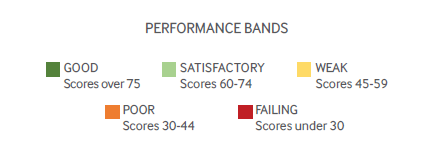
2021 Resource Governance Index: Mexico (Oil and Gas)
Mexico’s oil and gas sector scored 71 out of 100 points in the 2021 Resource Governance Index (RGI), placing in the “satisfactory” performance band, up one point since the 2019 Interim Evaluation and three points from the 2017 RGI. While Mexico has advanced in national budgeting, key areas, such as the governance of social and environmental impact, are still in need of improvement.
Key messages:
- Mexico’s ability to realize value from its oil and gas sector remained in the “satisfactory” performance band, driven by strong reporting practices by the National Hydrocarbon Commission.
- The governance of local impacts is “poor”, mostly due to opacity around the disclosure of environmental mitigation plans, which are currently labeled as confidential by the government.
- Governance of state-owned Pemex placed in the “satisfactory” performance band but could be improved through the disclosure of disaggregated commodity sales information, as well as information on joint ventures and noncommercial activities.
- Revenue management improved due to the adherence and monitoring of fiscal rules and strengthened subnational resource revenue sharing disclosures.
To continue improving resource governance, NRGI recommends the following courses of action:
- The government should bolster the role of industry regulators such as the National Hydrocarbon Commission, increasing their role and presence in the governance of the sector, especially considering possible changes to Mexico’s energy policy.
- The Ministry of Energy, and the National Agency for Security and Environmental Protection of the Hydrocarbon Sector have an urgent task to improve the quality of Environmental and Social Impact Assessments disclosures.
- Pemex should improve transparency around spending and commodity sales. Information on production volumes, values and the buyers of the state-owned oil enterprise’ production should be disaggregated down to each individual sale and available for public scrutiny. Non-commercial activities, and not only donations, should be acknowledged and publicly disclosed.
- The Ministry of Finance should disclose disaggregated revenue streams which constitute transfers from the Stabilization Income Fund of Federative Entities to subnational governments.
The 2021 RGI assesses how 18 resource-rich countries govern their oil, gas and mineral wealth. The index composite score is made up of three components. Two measure key characteristics of the extractives sector – value realization and revenue management – and a third captures the broader context of governance — the enabling environment. These three overarching dimensions of governance consist of 14 subcomponents, which comprise 51 indicators, which are calculated by aggregating 136 questions. For more information on the index and how it was constructed, review the RGI Method Paper.


